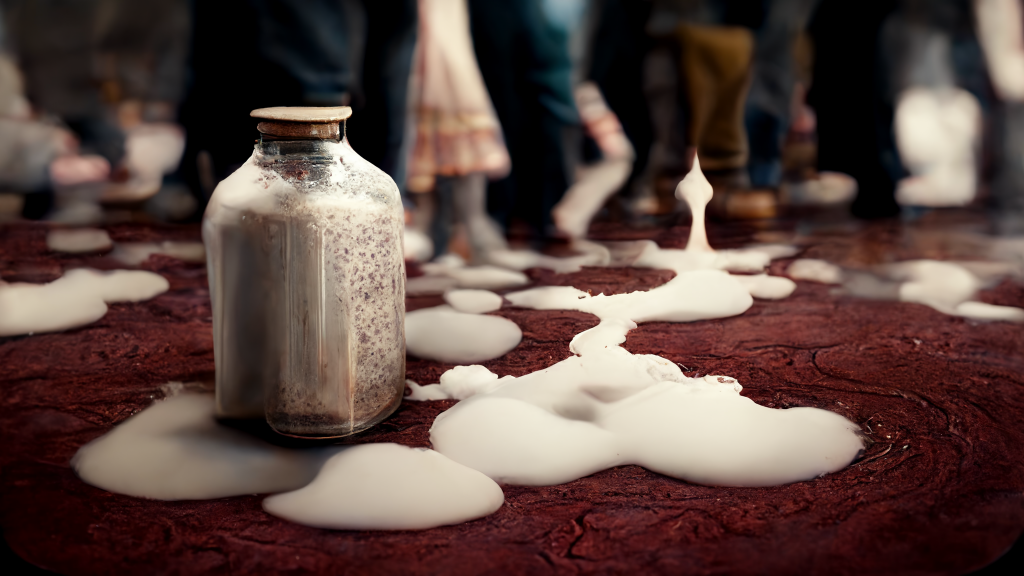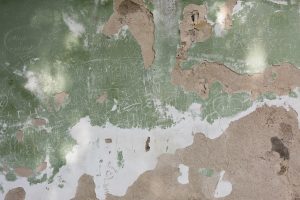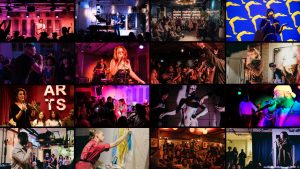Uniting the tofu-eating wokerati with the old world mindset can be easier than you think.
Suella Braverman may no longer be Home Secretary, but the sentiment behind name-calling such as ‘tofu-eating wokerati’ mirrors the hallmark of this age: fragmentation of society – and finding belonging in niche sub-cultures. From the real world to the virtual, if you want to find belonging in some obscure tribe, you can. But with the rise of extremely niche belonging comes a highly fractured and divided society – one that’s struggling to conquer or overcome the great challenges of our time. The world is in disarray because society has become utilitarian and profit-driven – we’ve forgotten what it means to be human.
What if we can unleash raw talent, collaborate consciously, and attempt to solve some of the greatest social challenges by catalysing inspiration through lived experiences?
No use crying over spilled milk.
After soup sacrilege and the defacing of a Van Gogh, new-age activism has now graduated to the pouring of milk on supermarket floors. Are we calling these events a climate change protest against the destruction caused by the industrial meat farming industry? Or a cry for help by a sub-culture that is marginalized and not heard?
And then there’s the issue of the effectiveness of such activism. Piers Morgan, dislikable as he is, was right about one thing in his interview with an Animal Rebellion spokesperson: not a single meat-eating person watching Big Ben get whitewashed thought that this would be the push they needed to change their diet. The jury’s still out on the effectiveness of these actions, but one thing’s for sure: nobody gave a f*ck that minimum-wage slaves would be the ones to clean up all the mess.
I argue, that the answer is not to point blame at people’s lifestyle choices or use disrespectful acts to add static to the noise. A positive outcome involves getting to the root of the extractive mindset problem: the notion that one group is better than the other, and can simply take what it wants as and when it wants it. When we discover our shared humanity, we can begin to address common challenges, ones that affect us all as humans – we’re all breathing the same air, aren’t we?
HEY, INTERNET, ANYBODY OUT THERE?
As the non-virtual world wallows in perpetual miscommunication, online communities get carved up by machines according to algorithmic interests, forming groups and cliques. The result? People living cocooned lives, bellowing out silent screams in echo chambers of their formed beliefs. And as the media landscape continues to fracture, influencer marketing shifts toward the creator economy – which is now deemed to be more genuine – and niches become ravines, making the divides even deeper.
The question on my mind is: how do we start to repair a situation that keeps worsening?
A RAW EXPERIMENT IN HUMAN CONNECTION
I set up What Does Not as a culture agency and creative incubator with the hypothesis that healthy, happy humans will create a constructive/regenerative culture. Using my code for cracking the human (ie. everyone wants to be seen, heard, and reassured) we can come together, find belonging and inspiration – then set out to shape the beast we call culture. The first event series in this experiment in human connection is called What Does Not RAW, and it’s a true storytelling night in which London is our lab.
Our experiment is this: London is the city of niche. No matter your jam, you can find any type of belonging or tribe that you want – from kink to neon naked life drawing. What if we put down our laptops and phones, parked our roles as keyboard warriors, and cut across all the silos of society to give people true belonging? Wouldn’t we light the creative spark dormant in everyone?
Loneliness was deemed such a serious public health issue that in 2018 the UK government appointed its first-ever Loneliness Minister, and launched The Tackling Loneliness Network. Because even though you may find people of a similar mindset in your chosen niche, living in a silo doesn’t make you feel more whole and accepted. It simply exacerbates the loneliness that’s plaguing all of society.
A safe space where misfits fit in
The WDN RAWs give people a place where they can celebrate their differences and be reassured of those differences – this is the true driver of social change. At the RAWs we’re giving the term inclusivity the meaning it always intended to have while taking chances on those that others won’t. Designed to tear down preconceived notions that prevent true connection and opportunity – RAWs bring the cool, edge, and belonging needed for navigating this age of uncertainty and change.
With 85% of future jobs yet to be invented (according to the Institute for the Future and Dell Technologies), this kind of social mixology is critical in fostering new and interesting approaches to the challenges we face. From Babylon to ancient Greece, places at the crossroads of cultures have always birthed innovative and powerful new paradigms. London can be such a place too. These ‘misfits’ of niche are the beating heart of the capital – and have so much in common with people who conform to social norms.
What happens at the RAWs?
Each RAW storytelling event has a different theme and brings together people from all walks of society to celebrate the power of that theme. In the past, these have included resilience, courage, acceptance, deviance – and, most recently, mind. We’ve created a night that pairs raw, uncensored stories by everyday humans with art, music, and immersive elements that are thought-provoking.
What’s more, each RAW is a platform for emerging creators. Helping emerging artists is central to WDN’s mission – giving them a leg up in a city that is expensive, where money and connections are almost always needed to get ahead. For WDN, if you don’t exist in the limelight, we want to know you.
And they’re free – because you can’t put a price tag or an agenda on genuine, human connection. Some have called it ‘the best event in London’ because that’s the power of connecting with other humans – especially in the post-pandemic age where remote working has become the norm. Coupled with creating a safe space for hard-hitting topics, we’re also changing the events planning game.
Systems change from the human, up
What’s the verdict? The impact of the events is palpable, transformational, and moving. The difference the RAWs make to people who are both speakers and attendees is humbling. They confirm that we do have more in common with people we thought weren’t ‘our cup of tea’. And with people coming forward to be speakers, to be exhibitors, and even offers to collaborate, they confirm that inspiration can be the glue and fuel of a creative ecosystem of changemakers.
What’s more, if you view culture like I do as everything humans do, to reach across the divide and say ‘hey, I see you, I hear you, I AM you’ is the most powerful thing we can do in this time of disconnection. To navigate this age of nested crises we need each other – that is a fact. At the RAWs, you don’t need to squeeze into latex or be LGBTQ+. The only prerequisite is to be human and to be kind.



